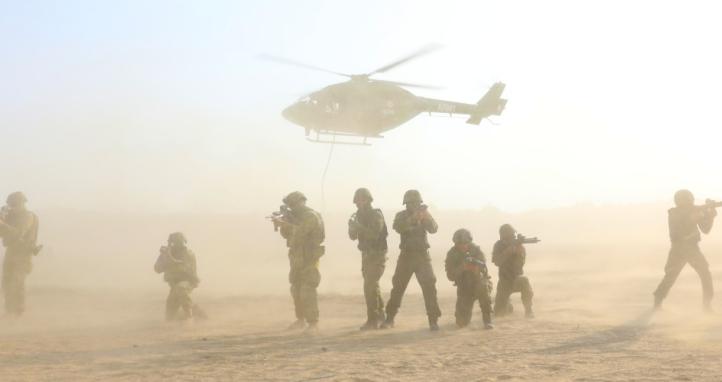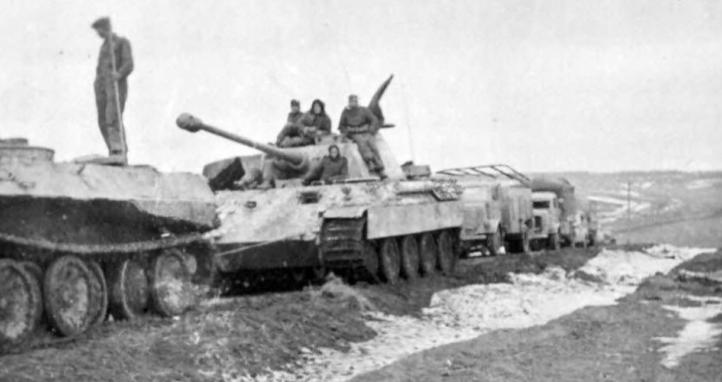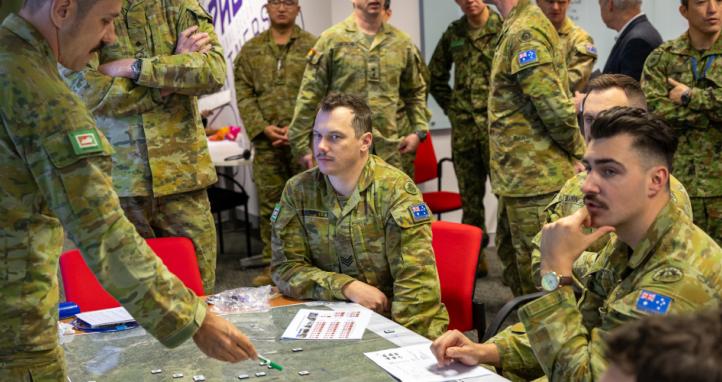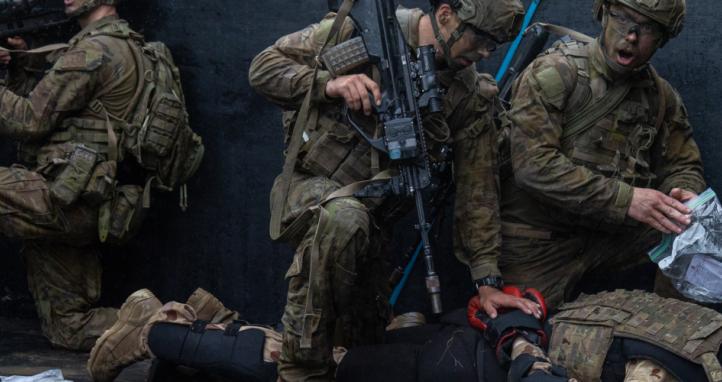Facts and figures
| Government type | Parliamentary Democracy Under A Constitutional Monarchy; A Commonwealth Realm |
| Notable people |
|
The 'Know Your Region' series is designed to support unit and individual professional military education on the South East Asian region. It's important for all serving members of our military to have a foundational knowledge of the countries and issues in the Indo-Pacific.
PNG – DIPLOMACY
On this page:
- Summary
- Politics
- PNG and Australia
- PNG and its neighbours
Summary
After being occupied and administered by a myriad of different western nations since 1884, Papua New Guinea (PNG) achieved independence in 1975. It continues to remain an active member of the Commonwealth of Nations, with Queen Elizabeth II as head of state represented by a governor-general. PNG is a member of APEC, the Pacific Forum, as well as the Melanesian Spearhead Group of countries. A secessionist movement in Bougainville between 1975 and 1997 was the focus of much internal friction, and the conflict resulted in the loss of 20,000 lives. PNG has heavily relied on Australia for foreign aid since sovereignty was achieved, being one of the largest recipients of aid provided globally by its neighbour.
Politics
PNG is a constitutional monarchy with governments at the national, provincial and local levels. The national government utilises the Westminster system of parliament, similar to Australia, with a 111 member unicameral legislature elected for five-year terms. The Prime Minister manages the government, appointed by the Governor General on recommendation of parliament.
The election of James Marape, in 2019, as Prime Minister was challenged by the Opposition leader – Belden Namah – who cited alleged parliamentary irregularities in the parliamentary election. After resigning as Prime Minster, Peter O'Neill was re-nominated among the candidates for the vote in parliament; but shortly before the vote, he withdrew his candidature, and James Marape was elected as Prime Minister. This was pushed to the PNG Supreme Court by the Opposition leader at the time, Patrick Pruaitch, and was subsequently pursued by the new Opposition leader, Belden Namah. In November 2020, a five-man Supreme Court bench unanimously ruled against the challenge, upholding Marape's position as Prime Minister.
For further reading on PNG’s politics, see the resources below: (a reminder, videos are available to view on your mobile devices or stand alone laptops - not on the DPN)
- Videos
- Podcasts
- Articles
PNG and Australia
PNG was an administrative region of Australia for the 60 years prior to independent sovereignty granted in 1975. PNG opted to remain part of the Commonwealth, maintaining Queen Elizabeth II as the head of state. The relative proximity to Australia, as well as historical ties that were heavily forged by both world wars, has ensured that PNG has remained a key focus in Australia’s foreign relations, with Australia remaining the largest provider of foreign aid. The relationship remains strong today, with sport often utilised as a means of bridging cultural differences and strengthening ties. Military exercises also assist in maintaining bonds between the two nations.
For further reading on PNG and Australia, see the resources below:
- Videos
- Podcasts
- Articles
- Australian High Commission – PNG
- Aus/PNG Network – LOWY
- The PNG – Australia development partnership (PDF)
- Joint Declaration for a New PNG/Aus Partnership – DFAT
- Improving accountability in PNG Governance and service - Australian Development Assistance
- Notes on representing Australia in PNG
- Benefits for all in Manus being a base for US/AUS forces
- The Torres Strait Treaty – Australia-PNG Border
- PNG Treaty Villages Resilience Program - Building Resilience in Treaty Villages, South Fly District, Western Province
PNG and its neighbours
China
Chinese and PNG relations began almost immediately after PNG independence, with China having gradually increased economic aid to PNG in recent years (as well as to other Oceanic nations), in an attempt to increase influence in the region, as well as to undermine Taiwanese efforts to gain diplomatic favour from PNG. Chinese PLA military units have; however, provided only sporadic training to the PNGDF. PNG was the first Pacific nation to sign up to the Chinese ‘One Belt One Road’ initiative, and Chinese interests have slowly increased their presence on the mainland, with new port and airport developments in the city of Lae being supported by Chinese companies.
For further reading on PNG and China see the resources below:
- Videos
- Podcast
- Articles
- A Chinese-built airport next door to a key AUS/US Naval base?
- Chinese Hong Kong law supported by PNG at UN
- PNG locals speak out at Chinese fishing proposals
- Papua New Guinea Offers a Stalking Horse for China
- China accuses Australia in meddling in PNG vaccination efforts
- Chinese Influence in PNG – 2018
- Chinese Vaccine Diplomacy in the Pacific
Indonesia
Indonesia and PNG share a common land border on the island of New Guinea, with West Papua remaining a province of Indonesia. A border treaty was officially signed in 1979; however, the ethnic and cultural makeup of West Papua remains more Papuan that Indonesian. This has caused occasional tensions between the two nations as refugees from West Papua frequently enter PNG seeking asylum, claiming persecution from Indonesian authorities. In 2017, PNG rejected a petition presented to the UN that sought West Papuan independence. Relations between the two countries remains cordial today.
For further reading on PNG and Indonesia, see the resources below:
- Articles
Solomon Islands
As two nations that bore the brunt of early heavy fighting in World War Two, PNG and the Solomon Islands share a common contemporary history that is characterised by occasional internal conflict and a focus by larger regional neighbours seeking to gain influence. Bougainville Island, whilst geographically part of the Solomon Islands archipelago, remains an autonomous region of PNG. In recent times, China has sought to increase influence in both nations, with the Solomon Islands recently changing its diplomatic recognition of China from Taipei over to Beijing. PNG and the Solomon Islands have both signed a maritime boundary treaty, enforced by their respective law enforcement and defence agencies, often with equipment provided by Australia. Relations between the two countries remains cordial.
For further reading on PNG and the Solomon Islands, see the resources below:
- Articles:
- PNG and Solomon Islands prepare COVID-19 vaccine roll out – ABC News
- PNG and Solomon Island border tensions – historical article
- Chinese pressure on Pacific nations – The Interpreter
- The Pacific Islands – Nature Conservancy
- Integrated country strategy – US Embassy for PNG, Solomon Islands and Vanuatu
Discussion questions
- Politics in PNG is often heavily influenced by tribal affiliations. How does this help or hinder development and governance in PNG, and what considerations should Australia maintain when dealing with PNG politically?
- As a signatory to China’s Belt and Road Initiative, PNG has demonstrated a willingness to seek assistance from nations outside of its historical linkages. How might the Australian and PNG relationship be influenced by an increased Chinese presence in the region? What actions should Australia take in response to this?
- PNG has long recognised Indonesia’s control of West Papua, despite having closer cultural and ethnic ties with the province. If that recognition changed to one of seeking unification with or independence for West Papua, what impact might that have on regional security? What stance might Australia take on the issue?
Know your region
Know Your Region series gives you a shortcut to understanding other nations in the Indo-Pacific region.









